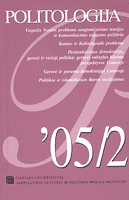Susvetinimas ir sąmoningumo formų sukeitimas kaip propagandinio subjekto konstravimo prielaidos
Estrangement and the Switch-up of the Forms of Conscience as the Basis of the Construction of a Propaganda Subject
Author(s): Gintautas MažeikisSubject(s): Politics / Political Sciences
Published by: Vilniaus universiteto leidykla & VU Tarptautinių santykių ir politikos mokslų institutas
Keywords: Estrangement; Symbolic thinking; Propaganda
Summary/Abstract: In this article the author aims to show the way the external forms of thinking and their estrangement enforce thinking in substitutive forms and the phenomenon of substituting the forms of self-conscience. In this article it is claimed that the construction of the autonomic ideological subject is an important purpose of the propaganda. Searching for this aim is based on the switch-up of the forms of self-conscience. What the author titles as the substitution of the forms of self-conscience is in fact the substitution of the personal experience and the experience that has gained the collective status, collective (group) thinking and models and the values of behavior. They alter the external forms of personal conscience, devoid of direct contact with the transcendental, creative I. They cannot resist the mechanisms of manipulation. Fragments of the collective, public memory are substituted for the personal existentialist experience. In this way they lay down the prerequisites for the creation of ideological subject and the interpolation of the transcendent subject. It gives way to the human being molded by propaganda and advertising. Later on he takes over the autonomic function of developing the propaganda himself. In terms of the creation of the ideological subject the author names the following three types of the information and propaganda impact: (a) the object of information; (b) agent and role serving; (c) ideological subjects. The first option picks the objects of information and transmits concrete messages over to them. The second alternative speaks about the invitation of the people who are to be informed to play some specific roles, imitate their belief and knowledge. The people who make decisions on their own, on the way the ideology should be developed, and what actions should be taken fall under the latter option. In this case, we speak about providing specific tasks, not the propagandist information, to the human that make him free as a result. Here we speak about the formation of some specific totality of the subject and his/her personality cherishing definite ideology, developing it autonomously and propagating it independent of the tasks. (...)
Journal: Politologija
- Issue Year: 2001
- Issue No: 4 (24)
- Page Range: 81-110
- Page Count: 30
- Language: Lithuanian

